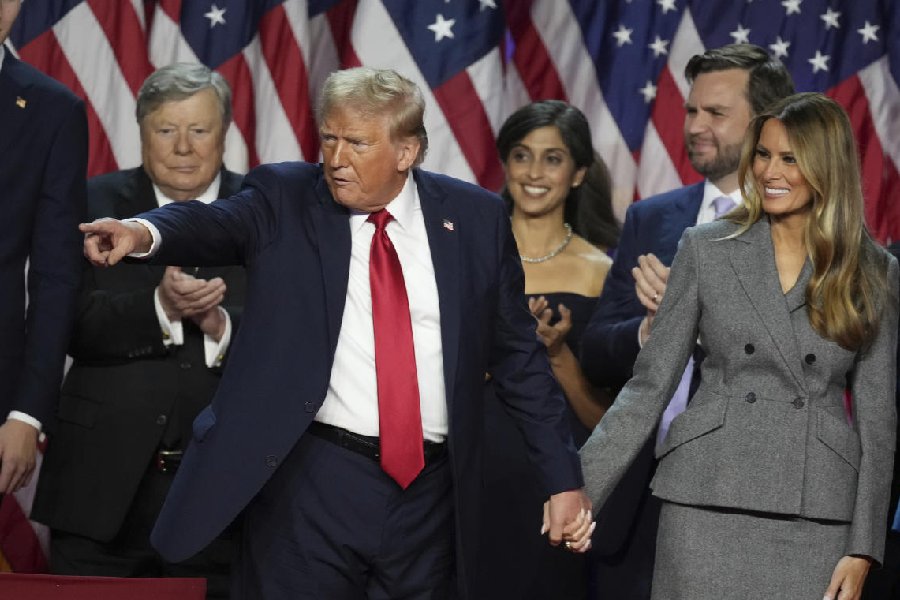President-elect Donald Trump, who had during his campaign boasted he could end the Russia-Ukraine conflict in “24 hours”, vowed to “stop wars” in his victory speech on Wednesday morning at his campaign headquarters in Florida.
“We had no wars, for four years we had no wars. Except we defeated ISIS (Islamic State),” Trump said as he took to the stage at his home at the Mar-a-Lago resort in West Palm Beach, Florida, to address the crowd of his supporters.
“They said ‘He will start a war,’ I’m not going to start a war. I’m going to stop wars.”
However, he made no mention of Ukraine or Ukrainian President Volodymyr Zelenksy, though he had promised to stop the war in Ukraine “in 24 hours” in a highly publicised comment in June 2023 without elaborating how he intended to do that.
His running mate, J.D. Vance, has been vocally against further aid to Ukraine, prompting concerns that Washington’s current support for Ukraine against Moscow’s invasion could come to an end.
Trump mentioned Russia in passing during his victory speech, where he said the US has more “liquid gold” — oil — than Saudi Arabia and Russia.
Besides his claim on Ukraine, Trump, during his campaign, warned that Israel would be “eradicated” if he lost the election.
Now that Trump has claimed victory, many at home and abroad are asking an urgent question: will he make good on his long list of foreign policy threats, promises and pronouncements?
The Republican has offered few foreign policy specifics, but supporters say the force of his personality and his “peace through strength” approach will help bend foreign leaders to his will and calm what Republicans describe as a “world on fire”.
They blame the global crises on weakness shown by President Joe Biden, though his fellow Democrats reject that accusation.
America’s friends and foes wonder whether his second term will be filled with the kind of turbulence and unpredictability that characterised his first four years.
Trump’s 2017-2021 presidency was often defined on the world stage by his “America First” protectionist trade policy and isolationist rhetoric, including threats to withdraw from Nato.
At the same time, he sought to parlay his self-styled image as a deal-making businessman by holding summits with North Korea, which ultimately failed to halt its nuclear weapons program, and brokering normalisation talks between Israel and several Arab neighbours, which achieved a measure of success.
“Donald Trump remains erratic and inconsistent when it comes to foreign policy,” analysts for the European Council on Foreign Relations wrote in a blog post during the US campaign. “Europeans are still licking their wounds from Trump’s first term: they have not forgotten the former President’s tariffs, his deep antagonism towards the European Union and Germany,” they said.
Trump and his loyalists dismiss such criticism, insisting that other countries have long taken advantage of the US and that he would put a stop to it.
Plan for Ukraine
But how Trump responds to Russia’s war in Ukraine could set the tone for his agenda and signal how he will deal with Nato and key US allies, after Biden worked to rebuild key relationships that frayed under his predecessor.
Ukrainian President Zelensky congratulated Trump on social network X, describing Trump’s peace-through-strength approach as a “principle that can practically bring just peace in Ukraine closer”.
Trump insisted last year that Russian President Vladimir Putin never would have invaded Ukraine in 2022 if he had been in the White House, adding that “even now I could solve that in 24 hours”.
He has been critical of Biden’s support for Ukraine and said that under his presidency, the US would fundamentally rethink Nato’s purpose. He told Reuters last year that Ukraine may have to cede territory to reach a peace agreement, something the Ukrainians reject and Biden has never suggested.
He has provided scant details about this plan but Vance, his running mate, said in a media interview that Trump would negotiate a demilitarised zone according to current demarcation lines. That would mean Ukraine cedes control of Russian-occupied Luhansk, Donetsk, Kherson and Zaporizhia, as well as the previously occupied Crimea, something the Ukrainians don’t want.
Nato, which backs Ukraine, is also under threat.
Trump, who has railed for years against Nato members that failed to meet agreed military spending targets, warned during the campaign that he would not only refuse to defend nations “delinquent” on funding but would encourage Russia “to do whatever the hell they want” to them.
“Nato would face the most serious existential threat since its founding,” said Brett Bruen, a former foreign policy adviser in the Obama administration.
Israel support
Trump will also confront a volatile West Asia that threatens to descend into a broader regional conflict. Israel is fighting wars in Gaza and Lebanon while facing off against arch-foe Iran, even as Yemen’s Houthis fire on commercial shipping in the Red Sea.
He has expressed support for Israel’s fight to destroy Hamas in the Palestinian enclave but has said Prime Minister Benjamin Netanyahu, a Trump ally widely believed to have favoured his return to power, must finish the job quickly.
Trump is expected to continue arming Israel, whose existence he said would have been endangered if Harris had been elected --- a claim dismissed by the Biden administration given its staunch support for Israel.
Trump has expressed little sympathy for the people of Gaza: more than 43,000 Palestinians in the besieged enclave have been killed in the war in the past year.
His policy toward Israel likely will have no strings attached for humanitarian concerns, in contrast to pressure that Biden applied in a limited way. Trump may give Netanyahu a freer hand with Iran.
But Trump could face a new crisis if Iran, which has stepped up nuclear activities since he abandoned a nuclear deal with Tehran in 2018, rushes to develop a nuclear weapon. When Trump was last in the White House, he presided over the signing of the Abraham Accords between Israel, the United Arab Emirates and Bahrain. But those diplomatic deals did nothing to advance Palestinian statehood in the West Bank and Gaza.
However, there was some tension between Netanyahu and Trump. In 2020, Trump presented a “Peace Plan” that entailed a two-state system with a Palestinian capital in East Jerusalem.
Palestinians condemned it for conceding too much territory to Israel. The plan ultimately fell apart after Netanyahu attempted to use the moment to announce Israel’s annexing of parts of the West Bank, which Trump hadn’t agreed to.
Trump continued to speak about his plan during the campaign. In the run-up to the election, Trump put on a charm offensive targeting the sizeable Lebanese and Arab American voter population, especially in the key battleground state of Michigan, promising peace.
Still, Trump is likely to push for the historic normalisation of relations between Israel and Saudi Arabia, an effort initiated during his first term and which Biden has also pursued.











